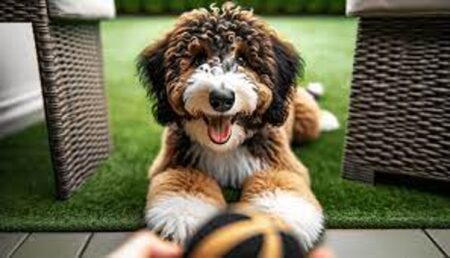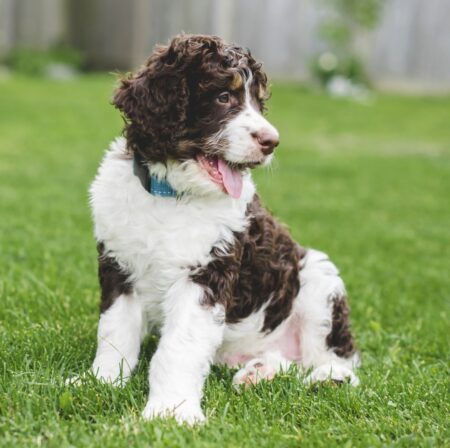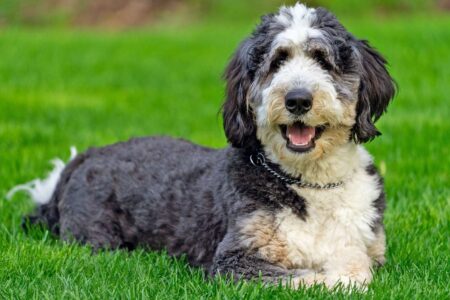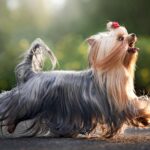
F1B Bernedoodle: The Perfect Family Dog
The F1B Bernedoodle is a hybrid dog that is the result of crossbreeding a Bernese Mountain Dog with a Poodle. This type of Bernedoodle is known to be hypoallergenic, intelligent, and affectionate which makes it an ideal companion for families. Because of its charming personality, low-shedding coat, and trainability, the F1B Bernedoodle is a versatile and beloved pet for families looking for a loyal and lovable furry friend.
SEE ALSO: Why Do Cats Meow? 10 Reasons Why
Overview of F1B Bernedoodle: The Perfect Family Dog
The F1B Bernedoodle is a hybrid dog that is the result of crossbreeding a Bernese Mountain Dog with a Poodle. This type of Bernedoodle typically has more Poodle genes than Bernese Mountain Dog genes, making it more hypoallergenic and low-shedding than other types of Bernedoodles.
- Weight: F1B Bernedoodles typically weigh between 40-90 pounds, depending on the size of the parents.
- Height: F1B Bernedoodles can range in height from 18-28 inches, depending on the size of the parents.
- Lifespan: The F1B Bernedoodle has an average lifespan of 12-15 years.
- Colors: F1B Bernedoodles come in a variety of coat colors, including black, brown, white, sable, merle, and parti-colored.
- Exercise: F1B Bernedoodles require moderate exercise, such as daily walks or playtime in the backyard.
- Training: F1B Bernedoodles are intelligent and eager to please, making them easy to train. Positive reinforcement and consistency are the best methods for training F1B Bernedoodles.
- Grooming: F1B Bernedoodles have low-shedding coats, but still require regular grooming to maintain their coat’s health and appearance. They should be brushed weekly and professionally groomed every 4-8 weeks.
What Are F1B Bernedoodle Like?
F1B Bernedoodles are known for their friendly, affectionate, and intelligent personalities, which is why they are highly social animals that thrive on human companionship and love being involved in family activities. They are also loyal and protective of their loved ones which makes them excellent watchdogs.
F1B Bernedoodles have a high level of intelligence and are highly trainable as they are quick to learn new commands and tricks and can be taught to perform a variety of tasks like retrieving items, learning basic obedience commands, and even performing agility exercises.
Can I Use One As A Service Dog?
Yes, F1B Bernedoodles can make great service dogs due to their intelligence, trainability, and social nature. Their hypoallergenic coats also make them suitable for people with allergies who need a service dog.
When choosing a service dog, it’s important to work with a reputable breeder who can provide you with a dog that has been bred specifically for service work and a good breeder will also be able to provide you with information on the dog’s lineage, health, and temperament.
Characteristics of F1B Bernedoodle
F1B Bernedoodles have several characteristics that make them unique and appealing to potential owners:
- Coat color: F1B Bernedoodles can come in a variety of coat colors, including black, brown, white, sable, merle, and parti-colored. Their coat color can depend on the genetic makeup of their parents, with Poodle genes often influencing the coat color of the F1B Bernedoodle.
- Coat type: F1B Bernedoodles have a low-shedding coat, which is one of their most appealing characteristics.
- Size: F1B Bernedoodles come in three main sizes: miniature (25-45 pounds), medium (45-75 pounds), and standard (75-90 pounds). The size of the F1B Bernedoodle is largely determined by the size of the parents.
- Personality: F1B Bernedoodles are known for their friendly, affectionate, and intelligent personalities which is why they are highly social animals that love spending time with their families and are eager to please their owners.
- Lifespan: F1B Bernedoodles have an average lifespan of 12-15 years, making them a long-term companion for many families.
- Health: F1B Bernedoodles are generally healthy dogs, but they can be prone to certain health conditions, such as hip dysplasia, elbow dysplasia, and eye problems.
F1B Bernedoodle Temperament
F1B Bernedoodles have a sweet and gentle temperament that makes them excellent family pets. They are loving and affectionate animals that form strong bonds with their owners. Here are some characteristics of the F1B Bernedoodle temperament:
- Intelligent: F1B Bernedoodles are highly intelligent animals that are quick to learn new commands and tricks. They can be trained to perform a variety of tasks, such as retrieving items, learning basic obedience commands, and even performing agility exercises.
- Friendly: F1B Bernedoodles are extremely friendly animals that love spending time with their families.
- Social: F1B Bernedoodles are highly social animals that thrive on human companionship. They are affectionate and loving dogs that enjoy being part of the family.
- Protective: F1B Bernedoodles can be protective of their family and home. They may bark or growl to warn off intruders, but they are not aggressive dogs.
- Loyal: F1B Bernedoodles are loyal and devoted animals that form strong bonds with their owners. They are faithful companions that will stand by your side through thick and thin.
Appearance of F1B Bernedoodle
The appearance of an F1B Bernedoodle can vary depending on the individual dog, but here is a general description of their appearance:
- Head: F1B Bernedoodles have a broad, flat head with a slightly domed skull. Their muzzle is usually medium in length and slightly squared off.
- Ears: F1B Bernedoodles have medium-sized ears that are set high on their head and hang down slightly.
- Eyes: F1B Bernedoodles have dark, almond-shaped eyes that are set wide apart.
- Nose: F1B Bernedoodles have a black nose that is slightly square.
- Body: F1B Bernedoodles have a muscular, well-proportioned body with a deep chest and straight back.
- Coat: F1B Bernedoodles have a low-shedding coat that is typically curly or wavy.
- Tail: F1B Bernedoodles have a medium-length tail that is carried high and curved over their back.
How Big Do F1B Bernedoodle Get?
F1B Bernedoodles can range in size depending on the individual dog, but typically they range from 25 to 90 pounds and 18 to 28 inches in height at the shoulder.
Cost of F1B Bernedoodle
The cost of an F1B Bernedoodle can vary depending on several factors, including the breeder, the size of the dog, the coat color, and the dog’s lineage. Here is a general overview of the costs associated with purchasing an F1B Bernedoodle:
- Puppy Prices: The cost of an F1B Bernedoodle puppy can range from $2,000 to $5,000, depending on the breeder and the characteristics of the dog.
- Adult Dog Prices: Adopting an adult F1B Bernedoodle can cost between $500 and $1,500. The cost of adopting an adult dog is typically lower than purchasing a puppy, as they are already spayed or neutered and may have already received basic obedience training.
Health Problems of F1B Bernedoodle
Like all dogs, F1B Bernedoodles are susceptible to certain health conditions that are common in both Bernese Mountain Dogs and Poodles. Here are some of the most common health problems of F1B Bernedoodles:
- Hip Dysplasia: Hip dysplasia is a condition in which the hip joint doesn’t form properly, causing pain and lameness.
- Eye Problems: Eye problems, such as progressive retinal atrophy and cataracts, are common in Bernese Mountain Dogs and can be inherited by F1B Bernedoodles.
- Gastric Dilatation-Volvulus (GDV): GDV, or bloat, is a condition in which the stomach twists and can cause vomiting, abdominal pain, and shock. It’s a serious condition that can be fatal if not treated promptly.
- Elbow Dysplasia: Elbow dysplasia is a condition in which the elbow joint doesn’t form properly, causing pain and lameness.
- Skin Conditions: F1B Bernedoodles can be prone to skin conditions, such as allergies and hot spots.
- Ear Infections: F1B Bernedoodles are prone to ear infections due to their floppy ears, which can trap moisture and bacteria.
- Obesity: F1B Bernedoodles can be prone to obesity, which can lead to joint problems, diabetes, and other health issues.
How to Take Care of F1B Bernedoodle
Taking care of an F1B Bernedoodle involves several steps to ensure that your dog is happy and healthy. Here are some tips on how to take care of an F1B Bernedoodle:
- Grooming: F1B Bernedoodles have low-shedding coats that require regular brushing to prevent matting and tangles. Their coats should be brushed at least once a week with a slicker brush or pin brush. Professional grooming is recommended every 4-8 weeks to keep their coat in good condition.
- Exercise: F1B Bernedoodles require moderate exercise, such as daily walks or playtime in the backyard. They are not high-energy dogs but do need to burn off excess energy to prevent boredom and destructive behaviors.
- Diet: F1B Bernedoodles should be fed a high-quality, balanced diet that meets their nutritional needs. Look for a food that is specifically formulated for large-breed dogs and contains high-quality proteins, fats, and carbohydrates.
- Socialization: F1B Bernedoodles are highly social animals that need to be socialized early in life to prevent them from becoming fearful or aggressive. Introduce your dog to a variety of people, places, and situations to help them develop into well-rounded dogs.
SEE ALSO: Why Do Cats Sleep So Much? 10 Reasons Why
FAQs:
Q. Is a Bernedoodle a good family dog?
Yes, Bernedoodles are generally considered to be excellent family dogs. They are affectionate, gentle, and intelligent, making them great companions for families with children. They also have low-shedding coats, which makes them a good choice for families with allergies.
Q. Is F1 or F1B Bernedoodle better?
It depends on your individual preferences. F1 Bernedoodles tend to be more like Bernese Mountain Dogs, while F1B Bernedoodles tend to have more Poodle characteristics. F1B Bernedoodles are more hypoallergenic and have a low-shedding coat, but F1 Bernedoodles may be more affordable and easier to find.
Q. What is the downside of a Bernedoodle?
The downside of a Bernedoodle is that it can be prone to health issues such as hip and elbow dysplasia, skin conditions, and eye problems. They can also be expensive to purchase and care for, as they require regular grooming, quality food, and veterinary care.
Q. What is the personality of an F1B Bernedoodle?
The personality of an F1B Bernedoodle is typically friendly, affectionate, intelligent, and social. They are eager to please their owners and are great companions for families and children. They are also playful and enjoy spending time with their owners.


